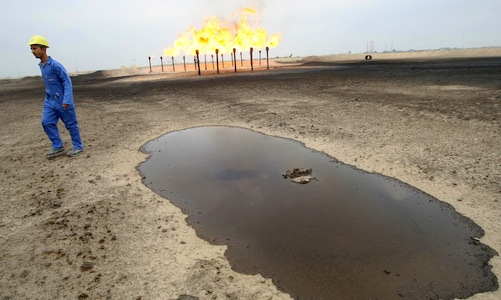Claiming success when failures are the norm is an art only a minority can master. On March 15, Iraq’s minister of oil wrote an article on the ministry’s website under the title A progress in gas but the ambition is bigger. The minister said “free gas production has risen from 600 million cubic feet a day (mcfd) during 2013—2014 to 1,100-mcfd as a maximum in the last months”.
The statement prompted Isam Al Khalisy, a veteran in the power industry and a keen observer of the energy situation, to write an open letter to the minister questioning these numbers. He said that according to official numbers on the ministry’s website “natural gas production in Iraq in the last few months was about 2,600-mcfd at a time when more than two-third of this is flared (1,800-mcfd) at a time when power stations are waiting for imported Iranian gas to operate for the first time or to boost generation.”
He went on to say that “Iraq signed two contracts with Iran — subject to Swiss law — to import 1550-mcfd, which is less than the flared gas even after processing and liquid recovery from the raw gas”.
The cost to Iraq — at $7.5 per million British Thermal Unit (BTU) — would be “$4 billion [Dh14.7 billion] a year after paying $715 million for a construction company charged with work by the Iranian side without a competitive tender”.
Chaotic treatment
Actually, it is not only the minister who avoids the question of domestic gas flaring and its relation to imports. Other high-ranking officials hide behind the fact that “dry gas production in Iraq is not sufficient for the needs of power stations now and therefore the Ministry is obliged to import from neighbouring countries”, according to the deputy minister on March 27.
The “chaotic treatment” of the gas situation is a result of ignoring to expand gas processing and to rehabilitate properly existing facilities since 2003. As a result, consumption of liquid fuels (crude, fuel, and gas oils) increased to generate “more than two-thirds of the electricity supply”.
“The cheapest of these fuels is more than double the cost of gas in electricity generation in addition to other higher operating expenses and the negative impact on the environment and the population,” Al Khalisy said in the letter. “The attrition to the economy in the last 10 years is a result of erratic decisions and management that did not attempt to stop gas flaring or even reducing it at cost that may even dwarf the recent revelation of corruption in the Ministry, which was revealed by Fairfax Media and Huffington Post.” Al Khalisy backed up his letter with graphics showing clearly the amount of utilised and flared gas.
The Minster graciously answered by writing a column in his newspaperAl Adala, saying that the flared gas has increased as a result of crude oil production increase and that the associated gas has been neglected for more than eight decades.
International oil companies
It is a shame on those advising the minister for not telling him the true history of gas utilisation. Only in the 1980s, when Iraq was at war and resources limited, two great processing projects were built to a combined capacity of more than 1,650-mcfd with other smaller plants before.
The minister blames the flaring on the fact that the first licensing round contracts with international oil companies excluded gas processing, which does not exonerate the ministry from doing the job they undertook. Especially as the Basra Gas Company, a joint venture with Shell and Mitsubishi, failed miserably to process gas and which was the reason for its formation.
The minister cited the same numbers as before, which are still a contradiction to those on the ministry’s website and claiming that gas oil imports were forgone due to the increase in gas delivered to the power stations.
While further discussion would be futile, the minister said: “As for Iraq’s import of gas and its cost, it is the [ministry of] electricity and its choice of fuel to generate energy” as if the ministry belongs to another country or government. He insisted that “even if all the gas is processed and flaring stopped, the gas will not be sufficient for the electricity requirement”. I ask — is this an excuse for flaring and imports?
Thermal power stations
In the 1960s, Iraq used the first stage gas with minimal processing or none to service all the oil companies operations and to fuel thermal power stations and supply fertiliser plants. The question is why can’t the ministry do the same now?
The minister says that Siemens, Hitachi and GE — the gas turbine manufacturers — are looking into it now. Let us hope that they and the ministry see the light.
The writer is former head of the Energy Studies Department at the Opec Secretariat in Vienna.
Source; Gulf News, Published: 12:26 April 17, 2016
http://gulfnews.com/business/analysis/iraqi-claims-that-have-no-basis-in-facts-1.1714115








Comment here